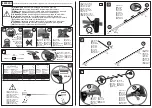
help avoid skidding on slippery surfaces during braking.
Refer to “Anti-Lock Brake System” in Section 5 of this
manual for more information about ABS.
TCS (Traction Control System)
This system monitors the amount of wheel spin of each of
the driven wheels. If wheel spin is detected, brake
pressure is applied to the slipping wheel(s) and engine
power is reduced to provide enhanced acceleration and
stability.
BAS (Brake Assist System)
The BAS is designed to optimize the vehicle’s braking
capability during emergency braking maneuvers. The
system applies optimum pressure to the brakes in emer-
gency braking conditions. This can help reduce braking
distances. The BAS complements the antilock brake sys-
tem (ABS). Applying the brakes very quickly results in
the best BAS assistance. To receive the benefit of the
system, you must apply continuous braking pressure
during the stopping sequence. Do not reduce brake pedal
pressure.
Once the brake pedal is released, the BAS is deactivated.
ESP (Electronic Stability Program)
This system enhances directional control and stability of
the vehicle under various driving conditions. ESP cor-
rects for over/under steering of the vehicle by applying
the brake of the appropriate wheel to assist in counter-
acting the over/under steer condition. Engine power
may also be reduced to help the vehicle maintain the
desired path.
ESP uses sensors in the vehicle to determine the vehicle
path intended by the driver and compares it to the actual
path of the vehicle. When the actual path does not match
the intended path, ESP applies the brake of the appropri-
ate wheel to assist in counteracting the oversteer or
understeer condition.
•
Oversteer - when the vehicle is turning more than
appropriate for the steering wheel position.
•
Understeer - when the vehicle is turning less than
appropriate for the steering wheel position.
100
UNDERSTANDING THE FEATURES OF YOUR VEHICLE
Summary of Contents for 2006 LX Magnum SRT8
Page 2: ......
Page 5: ...INTRODUCTION 5 1...
Page 8: ......
Page 82: ...82 UNDERSTANDING THE FEATURES OF YOUR VEHICLE...
Page 83: ...UNDERSTANDING THE FEATURES OF YOUR VEHICLE 83 3...
Page 84: ...84 UNDERSTANDING THE FEATURES OF YOUR VEHICLE...
Page 132: ...INSTRUMENTS AND CONTROLS 132 UNDERSTANDING YOUR INSTRUMENT PANEL...
Page 133: ...INSTRUMENT CLUSTER UNDERSTANDING YOUR INSTRUMENT PANEL 133 4...
Page 182: ...182 UNDERSTANDING YOUR INSTRUMENT PANEL...
Page 186: ...Operating Tips 186 UNDERSTANDING YOUR INSTRUMENT PANEL...
Page 214: ...214 STARTING AND OPERATING...
Page 248: ......
Page 263: ...6 1L ENGINE 6 1L Engine Compartment MAINTAINING YOUR VEHICLE 263 7...
Page 304: ......
Page 320: ......
Page 329: ...INDEX 10...
Page 343: ...NOTES...
Page 344: ...NOTES...
















































